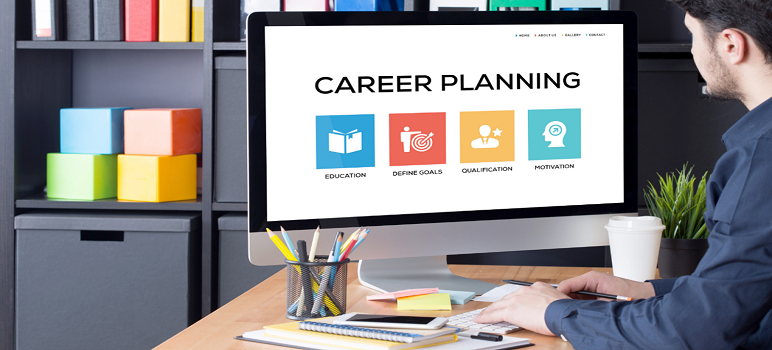How to develop a career plan: A company’s strength comes from its people, thus if you have workers under your supervision, you must ensure that they are motivated and engaged. The career plan is a wonderful tool for guiding your business and motivating your staff, demonstrating to them that you value their education and professional development.

What exactly is a career plan?
The career plan is a process that establishes professional goals and identifies both the activities to be done and the resources that must be committed to attain them. In the case of small and medium-sized businesses (SMEs), the career plan is developed in collaboration with each employee, taking into consideration their goals and interests, as well as their career and professional abilities.
This “roadmap” takes into account not only the workers’ training requirements, but also the company’s commercial objectives and the features of the industry in which it works. In practice, creating a career plan will assist you in identifying the growth that each person can have inside your firm, satisfying their professional objectives, and managing your organization more transparently and successfully.
Also Read: How to Improve Productivity at Work- 10 Efficient Tips!
The advantages of having a career plan in your company
Harmonizes the company’s strategy with the goals of the employees – The career plan is a useful tool for promoting corporate growth by educating and qualifying employees, allowing them to advance in their professional careers. It is a strategy that benefits everyone since professionalism improves the company’s outcomes.
Employees’ motivation and degree of devotion to the organization are increased – The career plan introduces new tasks and responsibilities to employees, allowing them to continue their professional development and, as a result, boost their motivation and recognition for the organization.
It helps to keep human talent and lowers staff turnover – A career plan lays forth a clear route to progress and gives some security inside the firm. Employees who are aware that they have possibilities within the business are less likely to seek them elsewhere, resulting in lower labor turnover and talent retention, which frequently results in cost, time, and effort savings for the firm.
Enhance the employer brand – A firm that cares about its workers’ professional growth and enhances their working environment is seen as a desirable place to work. A corporate culture that recognizes and rewards work and devotion strengthens the employer brand and raises the company’s social awareness, attracting fresh talent and allowing it to stand out from the competitors.
Boost productivity – Employees that are more motivated and happier with their jobs are more devoted to the organization and perform better. They are likely to cease viewing their jobs as responsibilities and begin to see them as modest milestones in their professional career, which will result in a better work atmosphere and higher productivity.
Also Read: How to Undergo Self-Transformation? 5 Easy and Effective Steps!
What is the best way to build a career plan?

1. Determine your company’s future requirements.
To create a career plan, you must first plan your workforce, taking into account the number of present workers and their jobs. Don’t overlook details like as turnover, churn, and retirements. For example, if the person in head of a department retires in five years, you will need to fill his job, thus it is advised that you train someone to take his place.
2. Determine the abilities needed for each role.
Each role in your firm has a competency-based profile. A salesperson, for example, must have strong communication skills, empathy, initiative, and the ability to negotiate and establish agreements. Knowing the skills of each role will help you to select the best candidate for the job. You may begin by establishing an individual profile for each of your workers using the following information:
- Name of the employee
- Age
- Academic training
- Position held
- Seniority in the company
- Strengths and main competencies
- Points to improve that negatively influence your work
- Training needs
- Performance evaluation
- Possible positions to fill
Also Read: How to Undergo Personal Improvement- 8 Efficient Tips!
3. Create a plausible professional path.

You may construct the linkages between the various roles in your firm using the organization chart in one hand and the job descriptions in the other. The goal is to construct a visible career map in which you explain the requirements of each position and the path to take to get there.
As a result, your workers will know right away what their opportunities for advancement within the firm are and what measures they need to take to advance and accomplish their professional goals.
4. Arrange for training
During this step, you must establish what kind of training each of your employees requires in order to advance in your firm. It is a good idea to begin with performance assessments since they will help you grasp workers’ capacities and potential, as well as their weak spots and places for improvement.
You can benefit from both bonus training programmes, as well as the expertise of other employees who can instruct younger staff. You may even swap tasks so that workers get to know the different sectors of the organization and create a more comprehensive picture of how it operates. Whatever training activity you pick, make sure it adheres to a well-structured strategy that anticipates the worker taking on intermediate positions.
5. Determine the duration of the application
A career plan with no deadlines is likely to become a dead letter. It is critical that you estimate a realistic time to fulfil each of the objectives with your personnel. It also provides review deadlines so that you always know where you are on the path and whether or not you need to make changes.
Setting yearly objectives and reviewing them at the end of each year makes the process of analyzing and monitoring your career strategy much easier.
Many firms make mentorship programs available to their workers in order to promote the growth of their professional careers and the training of their employees. These programs assist employees who desire to advance and improve their career plan professionally.
Many firms make mentoring programs available to their workers with the goal of helping them in the growth of their professional careers and the training of their employees, respectively. These programs assist employees who wish to advance in their careers and advance in their fields.
Also Read: How to be more attractive in 10 crazy ways!